I have met Chris and Georgi in June 2011 when they came to Romania to present Stockpodium at the third edition of VentureConnect. And since then, we tried to stay in touch as often as possible: I visited them in Sofia, participating in Open Coffee and so on. A couple of days ago I discovered that Chris and Georgi were the cool tech guys behind Imagga, company that won second place in the start-up competition powered by Intel: Intel Business Challenge.
Imagga Ltd develops and offers technologies, services, and online tools for visual image search, image processing, and image understanding in the cloud. And by participating and winning second place in the European round of Intel Challenge, Chris and Georgi will travel to UC Berkeley for the finals in November 2012. And to that we also add a considerable 15.000$ cash prize. For Intel Business Challenge (Europe), almost 4,000 ideas were submitted through 20 affiliated competitions and on-line platform. Among all the nine categories (including nanotechnology, robotics, biotechnology, electronics, or energy), the most – almost half – of all the projects were submitted in the areas of Software and IT and Mobile and Wireless. Romania also had a valuable presence, Appscend being one of the most important businesses present in the competition.
You can easily imagine that I wrote to Chris and Georgi immediately for a follow-up interview. And, as always, enjoy! 
1. You’ve attended VentutreConnect in May 2011, when you were just getting started. How are things now — what have you been working on in the last year?
We’ve been really busy during the last year at Imagga. Things rapidly changed, we pivoted a bit our business model and shifted from pure B2C to B2B model. Our flagship project www.stockpodium.com is doing really great, but we decided to focus more on the technology part of our startup. Imagga is a cloud platform that helps businesses and individuals to organize their images in a fast and cost-effective way. We are taking advantage of the huge hype for images. All the affordable smart phones and digital cameras, photo-sharing apps, and visual exploration web-sites make our lives really image intensive. Every single day over 1, 4 billion photos are shared online. This is huge opportunity for Imagga. We believe our services are really needed as every web company is starting to deal with constantly growing image databases.
 2. You’ve attended Intel Business Challenge and won second place. Congratulations, I believe this is amazing! Could you briefly describe the experience?
2. You’ve attended Intel Business Challenge and won second place. Congratulations, I believe this is amazing! Could you briefly describe the experience?
Intel Business Challenge was awesome. Really well organized and inspiring. It’s amazing to see so many young people with such a passion for innovation, well educated, well behaved, trained to deliver excellent presentations, but most of all, with great business ideas. The format of IBC evolved and this year most of the preselection process was done offline. During the previous years, Eastern and Western Europe have had their own competitions. This year Intel and the organizers in Europe decided the divide is no more needed. The quality of the ideas and the teams was really high. We are thrilled to be one of the only Eastern European team that made it through the finals and in November will be pitching in University of California, Berkley at IBC World. It’s great experience and also an amazing opportunity to represent Bulgaria and the so called New Europe.
3. Is this type of program something you would recommend further on? I bet the money is great, but it’s more to it than that.
It’s great program and experience. First you learn how to put your ideas on paper, then if it’s a good idea, you will be given the chance to meet and talk to mentors with lifelong experience in business and product development, etc. Going through the mentoring time and the pitching experience is really valuable. This something you can’t learn by reading, it needs to be practice in real, live environment. Specially in Eastern Europe we are not well thought how to speak in front of people, how use properly the body language and how to give short, focused answers. These are skills much needed as in real life you will not have a second chance to pitch in front of investor and redo any damage. English is also the language of the entrepreneurship, so being fluent when you present is something that won’t happen overnight. Competitions like IBC are so needed in countries like Bulgaria and Romania, so I encourage every young person to try and get the best out of the format.
4. I have the pleasure to know you for quite some time now — coming close to two years. You are entrepreneurs, marketers, Project Managers for various entrepreneurial local initiatives. Can you describe your activities for this autumn?
We want to see the entrepreneurial ecosystem in Bulgaria advance. That’s why we help with what we can to see that happen. Chris is very active in organizing monthly OpenCoffee meetups, and also Startup Weekend Sofia, which was great success with more than 200 people that attended in total in May and September editions. Georgi is actively involved as a mentor and scout at LAUNCHub, one of the seed funds that operate under the Jeremie initiative and is also teaching Technology Entrepreneurship in Sofia University. We believe giving back to the community is really important, that’s why we take some of our time and help out other young people. We see that more like a mission than as a day job. The wellbeing of our company Imagga is of higher priority but whenever we have time we are delighted to be part of an event or initiative that will help Bulgaria become high tech nation.
5. What I’ve noticed lately, and actually love it, is that the Bulgarian community is constantly growing: new projects, new funds (Eleven, LauncHub), new local initiatives such as Betahouse. Where do you see yourselves as businessmen in the following years?
Our priority is Imagga. We really want to see our company mature and grow. If this means we need to move to some other location, let be it. Our mission is to smartly automate image organization and give people more time for tasks that are more important for their live. We believe the following years we need to focus on advancing our image understanding technology and also significantly growing our customer base.
We love what we do, and are excited about the opportunities that have been created in Bulgaria to do what we love. LauncHub and Eleven will play significant role in funding Bulgarian and regional startups in the following years. Organizations like StartUP Foundation, which by the way is the first entrepreneurial organization in the country (and the reason I got fired up with starting a tech startup) and events like OpenCoffee and Startup Weekend are an important players in creating startup culture. We will see more funds coming to the region, more exciting startup events, and hopefully more success stories.
6. Let’s imagine this article is read by young entrepreneurs, that have a business idea, but did not start developing their project. I bet there are quite some few in Bulgaria and Romania as well. From your experience, what would you recommend in the first stages of their business?
When I talk to young people (I still feel young, but got disappointed this year, they say I am too old to participate in some youth activities) I usually see two things – they are afraid somebody will steal their idea or they are afraid of failure. Ideas cost nothing until you act on them and transform them in a profitable business. The failure attitude is something we need to address as society. In the States, if you have started and failed, you are viewed as somebody that has gained experience and it’s more likely to invest in you. In countries like Bulgaria or maybe even Romania, people believe you have just one chance. I strongly believe life has way much to offer to the young people in our region, but they need to dare to share the ideas, dare to start their own business, even if they at first fail, but try again until they succeed.
7. Speaking from your own personal experience, is Eastern Europe a place to grow your business?
For some business it’s great place to grow your business. Unfortunately for most tech startups that’s not true. It might be good place to start, test your product, get convenience in contacting prospective customers, acquire some tech talent. But to truly grow your startup I believe you need to be move where your customers are. Most of them usually live in Western Europe and USA, so that’s the best you can do. You can still keep an active role here on the Balkans, but sales and biz development needs to be moved where the customers are. This is also required by VCs as well. They invest in companies that are located let say 20-30 miles away from their office. So if you need to grow, get worldwide traction, consider you will eventually need to open an office in London, Berlin or San Francisco.
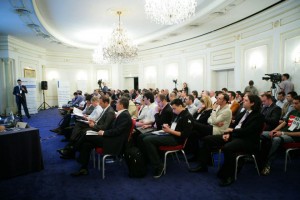

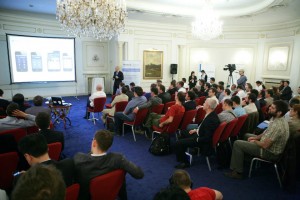
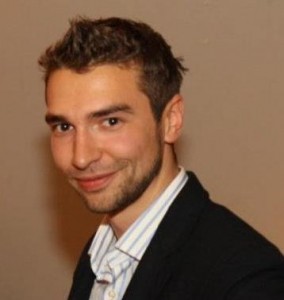 I first meet
I first meet 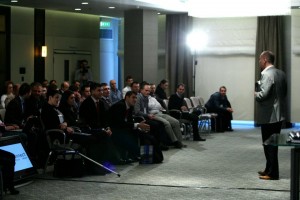 VentureConnect, the initiative that started in 2010, reached its fifth edition. The entrepreneurs interested to present thier business in front of over 40 investors from Romania, Bulgaria, Hungary or Poland can submit thier projects until 20th of May. Along with the traditional pitching event, the second part of the day will host a conference dedicated to Romanian investors, interested in supporting entreprenorial start-ups in the IT, Online, Technology areas: Angel Connect.
VentureConnect, the initiative that started in 2010, reached its fifth edition. The entrepreneurs interested to present thier business in front of over 40 investors from Romania, Bulgaria, Hungary or Poland can submit thier projects until 20th of May. Along with the traditional pitching event, the second part of the day will host a conference dedicated to Romanian investors, interested in supporting entreprenorial start-ups in the IT, Online, Technology areas: Angel Connect.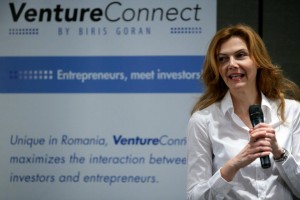 “We are very happy with all the start-up projects that were submitted, from the first Venture Connect event in 2010 to the most recent ones for the event on 31st of May. Together with the Venture Connect Board members, we’re doing our best to bring to Bucharest investors interested in the local entrepreneurial market and to facilitate the development of local business to become internationally recognized” declared Ana-Maria Andronic, Senior Associate at Biriş Goran, co- founder member of VentureConnect Foundation.
“We are very happy with all the start-up projects that were submitted, from the first Venture Connect event in 2010 to the most recent ones for the event on 31st of May. Together with the Venture Connect Board members, we’re doing our best to bring to Bucharest investors interested in the local entrepreneurial market and to facilitate the development of local business to become internationally recognized” declared Ana-Maria Andronic, Senior Associate at Biriş Goran, co- founder member of VentureConnect Foundation.